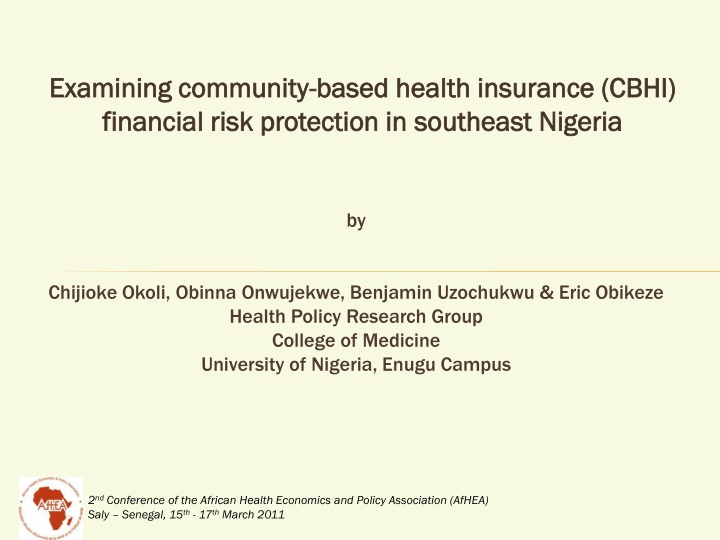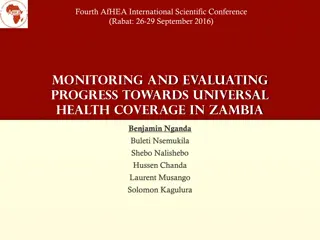
Financial Risk Protection through Community-Based Health Insurance in Southeast Nigeria
This study examines the financial risk protection provided by Community-Based Health Insurance (CBHI) in southeast Nigeria. The CBHI scheme, initiated to address health care challenges in Anambra State, utilizes collective pooling of health risks through small premiums. The objective is to assess CBHI's effectiveness in offering financial protection for illness in different communities.
Download Presentation

Please find below an Image/Link to download the presentation.
The content on the website is provided AS IS for your information and personal use only. It may not be sold, licensed, or shared on other websites without obtaining consent from the author. If you encounter any issues during the download, it is possible that the publisher has removed the file from their server.
You are allowed to download the files provided on this website for personal or commercial use, subject to the condition that they are used lawfully. All files are the property of their respective owners.
The content on the website is provided AS IS for your information and personal use only. It may not be sold, licensed, or shared on other websites without obtaining consent from the author.
E N D
Presentation Transcript
Examining community Examining community- -based health insurance (CBHI) based health insurance (CBHI) financial risk protection in southeast Nigeria financial risk protection in southeast Nigeria by Chijioke Okoli, Obinna Onwujekwe, Benjamin Uzochukwu & Eric Obikeze Health Policy Research Group College of Medicine University of Nigeria, Enugu Campus 2ndConference of the African Health Economics and Policy Association (AfHEA) Saly Senegal, 15th- 17thMarch 2011
Outline Background Objective of study Methods Results Discussion and conclusion 2ndConference of the African Health Economics and Policy Association (AfHEA) Saly Senegal, 15th- 17thMarch 2011
Background Community- based health Insurance (CBHI) scheme is a non- profit type of health insurance used by poor people and those in the informal sector to protect themselves against the financial risk of illness. CBHI is based on collective pooling of health risks members pay small premiums on a regular basis to offset the risk of needing to pay large health care fees upon falling sick. Membership in the scheme is voluntary 2ndConference of the African Health Economics and Policy Association (AfHEA) Saly Senegal, 15th- 17thMarch 2011
Background contd In Anambra State, CBHI scheme was initiated in 2003 to restrain the dwindling health care delivery that arose due to: Budget constraint Health workers industrial action that lasted for one year and The consequent closure of all public health facilities However, membership to scheme in the state is by individuals/households and a minimum of 500 persons were required to form a user group. Members pay a N100 ($0.8) flat rate monthly, or yearly or in convenient instalments. 2ndConference of the African Health Economics and Policy Association (AfHEA) Saly Senegal, 15th- 17thMarch 2011
Background contd The scheme is managed by 3 persons employed by the Community Health Committee (CHC). The CHC is made up of : the traditional ruler the town union president the town woman leader representative of the Ministry of Health representative of the Local Government Area one male and one female from each of the community. 2ndConference of the African Health Economics and Policy Association (AfHEA) Saly Senegal, 15th- 17thMarch 2011
Objective of study To determine CBHI financial risk protection in two communities with varying success levels in implementing the scheme. 2ndConference of the African Health Economics and Policy Association (AfHEA) Saly Senegal, 15th- 17thMarch 2011
Methods: study area The study was undertaken in Anambra State, southeast Nigeria. population of about 4.1 million people. the state consists of 21 local government areas and 3 senatorial zone. Prior to the study, CBHI was established in 10 communities namely: Ifite Ogwari, Ugbene and Achala in Anambra north senatorial zone; Abagana, Alor, Neni and Awka in Anambra central senatorial zone and Igbokwu, Okija and Mbosi in Anambra south senatorial zone. Apart from Awka, the state capital, all other communities are rural communities. Each community has a health centre that serves between 4-7 villages 2ndConference of the African Health Economics and Policy Association (AfHEA) Saly Senegal, 15th- 17thMarch 2011
Methods: Study design The study was cross sectional - quantitative. Out of the 10 pilot communities in 9 rural and 1 urban LGAs, 2 communities from 2 rural LGAs were selected for the study. The 2 rural LGAs were selected because most of the LGAs where the scheme is piloted are rural and mainly inhabited by people in the informal sector. One successful site (Igboukwu) and one not successful site (Neni) were purposively chosen. CBHI scheme success was determined by enrolment data in the facilities being used as well as views of the state managerial team. 2ndConference of the African Health Economics and Policy Association (AfHEA) Saly Senegal, 15th- 17thMarch 2011
Sampling and sample size Quantitative and WTP data were collected using a pre-tested interviewer-administered questionnaire. The contingent valuation method (CVM) was used to elicit WTP using the bidding game and structured haggling question formats. Questionnaire was administered to 1000 households/respondents (i.e 500 per community) Households were selected by simple random sampling from a sample frame of primary health care house numbering system. Adequate sample size was determined, using a power of 80%, 95% confidence level and utilization rate of public health facilities of 20%. The heads of households or their representatives (if the household head was absent) were interviewed. 2ndConference of the African Health Economics and Policy Association (AfHEA) Saly Senegal, 15th- 17thMarch 2011
Data collection and analysis Demographic and socio-economic characteristics data as well as willingness to renew registration. SES information on asset ownership and household weekly food expenditure were also collected. Principal components analysis method was used to generate SES index in order to examine whether there were systematic differences in enrolment into the scheme. the study populations were classified into four quartiles (least poor, poor, very poor and poorest) The Kruskal-Wallis statistic was used to determine whether means of quartiles were significantly different. 2ndConference of the African Health Economics and Policy Association (AfHEA) Saly Senegal, 15th- 17thMarch 2011
Results SOCIO-ECONOMIC CHARACTERISTICS A total of 455 and 516 questionnaires for Igboukwu and Neni respectively were available for analysis. Majority of the respondents were females and wives or female household heads. The highest level of education and occupation of enrollees in the scheme in both communities were primary education and petty trading. 36.5% in Igboukwu and 32.8% in Neni had primary education while 50.3% in Igboukwu and 61.4% in Neni were petty traders. 2ndConference of the African Health Economics and Policy Association (AfHEA) Saly Senegal, 15th- 17thMarch 2011
Result contd Mean per capita household weekly food expenditure was N726.3 ($5.8) in Igboukwu and N508.1 ($4.1) for Neni. 2ndConference of the African Health Economics and Policy Association (AfHEA) Saly Senegal, 15th- 17thMarch 2011
Enrolment with CBHI 100 85.1 51.3 90 80 70 60 50 % % 48.7 No Yes 40 30 20 10 14.9 0 Neni Igboukwu Fixed threshold level Fixed threshold level 2ndConference of the African Health Economics and Policy Association (AfHEA) Saly Senegal, 15th- 17thMarch 2011
Reasons for registering Good quality of drugs Prompt services Neni Availability of drugs Igboukwu Improved accessibility Financial risk protection 0 10 20 30 40 50 60 70 80 90 2ndConference of the African Health Economics and Policy Association (AfHEA) Saly Senegal, 15th- 17thMarch 2011
Result contd Most respondents who registered did so because they perceived that the scheme offered financial risk protection Availability of good quality drug was the next most common reason for registering in both communities. Mean cost of registration was highest amongst the most poor in Igboukwu (N130.2, SD=128.3) and highest amongst the poor group in Neni 2ndConference of the African Health Economics and Policy Association (AfHEA) Saly Senegal, 15th- 17thMarch 2011
Willingness to renew 90 83.9 80 70 60 56.6 50 Yes No 43.4 40 30 20 16.1 10 0 Igboukwu Neni 2ndConference of the African Health Economics and Policy Association (AfHEA) Saly Senegal, 15th- 17thMarch 2011
Discussion and conclusion Coverage was low in both communities but more especially in the community the scheme was less successful. Although the average premiums were small, the contributions were regressive and unaffordable to the very poor. For sustainability and financial viability of CBHI, efforts need to be made to increase the number of enrollees, so as to increase the pool of funds and risk sharing. CBHI premiums should be supplemented by subsidies from government and donor funding in order to ensure equitable financial risk protection. 2ndConference of the African Health Economics and Policy Association (AfHEA) Saly Senegal, 15th- 17thMarch 2011
Merci! 2ndConference of the African Health Economics and Policy Association (AfHEA) Saly Senegal, 15th- 17thMarch 2011
Acknowledgment Consortium for Research on Equitable Health Systems (CREHS) Health Policy Research Group, Enugu, Nigeria 2ndConference of the African Health Economics and Policy Association (AfHEA) Saly Senegal, 15th- 17thMarch 2011






















